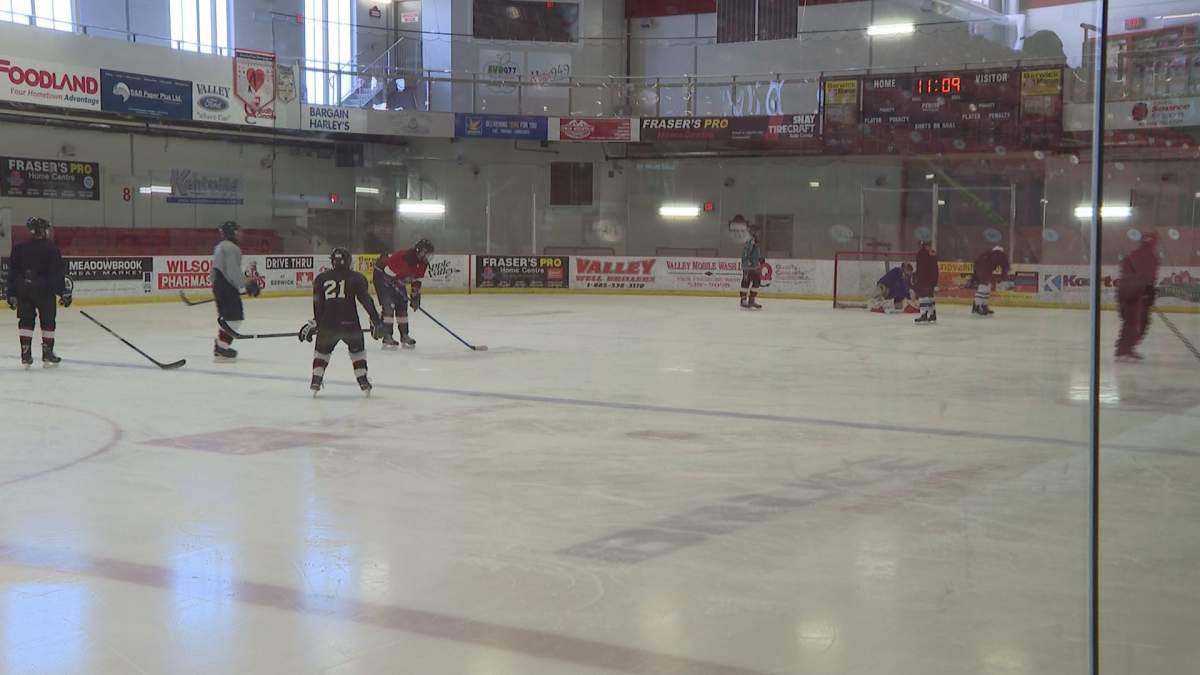Like many other recreation facilities in Nova Scotia, the Kings Mutual Century Centre, known as ‘The Apple Dome,’ in Berwick is feeling the adverse impact of the COVID-19 pandemic and its subsequent restrictions.

“Our revenues are down at least 50 per cent,” he says of the rink.
Representatives with the Recreation Facility Association of Nova Scotia appeared before the community services committee Tuesday where they described the Omicron wave of novel coronavirus as the “most challenging yet” for their members.
The association represents 193 facilities across the province, including rinks, pools and community centres.
While some government support was available in earlier waves of the pandemic, that hasn’t been so this time around, Nauss says.
“The fifth wave has been the most challenging for our facilities … there’s not as much support, and the wage subsidy has stopped,” said Jennie Greencorn, the association’s executive director.
Greencorn added that many facilities have had to lay off staff over the last two years and have endured a series of closures because of restrictions.

Get weekly health news
Mikaela Etchegary, a spokesperson for Nova Scotia’s Department of Communities, Culture, Tourism and Heritage, says officials have “ongoing conversations with the Recreation Facility Association of Nova Scotia to understand the needs of facilities across the province.”
The province provided $1 million in emergency support grants for 56 non-profit groups in the recreation sector last November. The grants ranged from $1,000 to $50,000.
Etchegary says non-profit rec facilities are also eligible for the Sector Impact Support Program
The Apple Dome has kept its four staff looking after the rink, but staying on top of operation costs has been challenging considering revenues are down.
- Bank of Canada holds rates, says policy can’t make up for tariff ‘damage’
- Pizza Pops contaminated with E. coli tied to 7 hospitalizations, data shows
- Canada deal on Chinese EVs shows trade ‘trumped national security’: experts
- Canada could increase real GDP by 7% if it drops all internal trade barriers: IMF
“In the previous years, we were probably 80 hours-a-week for rentals — between 70 and 80 hours — and we’re down now, 20 to 30,” Nauss says.
Beginning Monday, sports practices and rehearsals for arts and culture performances can have up to 25 people indoors and 50 outdoors.
Multiple groups of participants and spectators will not be allowed, and games and performances will still not be permitted.
A tournament was scheduled next weekend, with four full days of ice bookings. That event had to be cancelled.
Aside from lack of bookings, it’s challenging to get sponsors for a rink where people aren’t frequently visiting, and more challenging to fundraise during the COVID pandemic.
“I think most facilities, whether they be rinks, pools, or community halls, have all faced the same challenge,” Paul MacDonald, the Centre 200 general manager and CBRM manager of facilities, said told last week. “We have expenses that are current and continue and our revenues have disappeared.”
While the Berwick Curling Club calls The Apple Dome home, it pays its own way, except for some shared costs.
Most of its revenues come from membership fees.
“What we rely on through the season to supplement that is income from our bar operation as well as our advertising support and those are the two things that are really suffering right now,” said Mike Larsen, the club president. “The club has basically been inactive since two days before Christmas.”
That has led to some members inquiring about refunds. But it’s tough to plan a recovery, or the ask for help, given pandemic uncertainty.
“We don’t want to think in terms of now the season is a loss,” Larsen says. “We’re still focused on being able to get back up and running and getting whatever we can out of the rest of the season.”
While practice restrictions will loosen, he says it’s a matter of getting games back on the ice.
“Curlers, most of them, the vast majority are club curlers … they’re social curlers,” he said. “They don’t want to practice. They want to come out, throw a few rocks, have a game, see their friends, have a drink afterwards and go home.”
Operators are hopeful provincial restrictions will lift further Feb. 14.
“What our facilities should be doing right now is working on a long-term recovery strategy because they will need one, but they can’t see past this wave to the next season,” Greencorn said. “Any facility that is not attached to a municipality right now is at risk.”
— with files from The Canadian Press









Comments